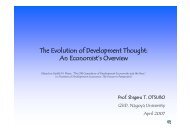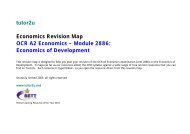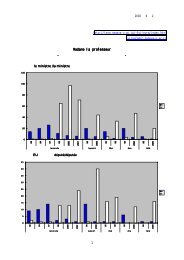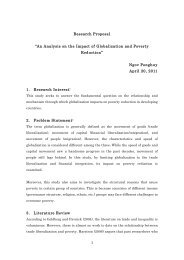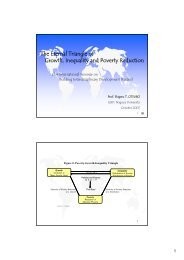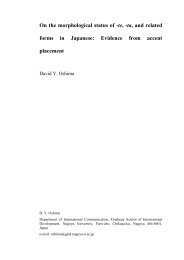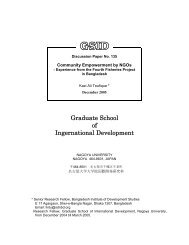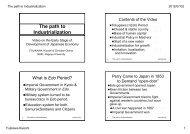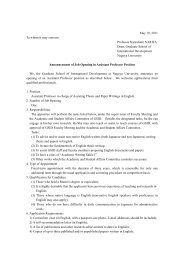Report
Report
Report
Create successful ePaper yourself
Turn your PDF publications into a flip-book with our unique Google optimized e-Paper software.
102 QUANTIFICATION OF BENEFITS FROM ECONOMIC COOPERATION IN SOUTH ASIA<br />
As part of its accession negotiations Bhutan seems<br />
to have submitted liberal services offer in the WTO<br />
and if Nepal is any reference point then it is sure that<br />
Bhutan would be finally making wider and deeper<br />
commitments in services. As of now it appears it has<br />
covered a number of services sectors in its offer. Like<br />
Nepal and the Maldives, while Bhutan has export<br />
interest in tourism it has strong import interest in<br />
education and construction services.<br />
Least Developed Countries<br />
As four out of seven South Asian countries are LDCs,<br />
any study ought to take into account their special<br />
position. It is interesting that the significance of the<br />
services sector is growing in all South Asian LDCs. The<br />
Maldives’ services sector largely due to its booming<br />
tourism has sustained a relatively high rate of growth.<br />
Similarly, Bangladesh, Bhutan and Nepal have also<br />
shown better growth in services and have a liberal trade<br />
regime in place. However, it is a matter of concern that<br />
apart from Nepal and Bhutan – recently acceded and<br />
acceding countries respectively – the commitments<br />
made by the remaining LDCs in South Asia, i.e.<br />
Bangladesh and the Maldives are far below the<br />
prevailing level of liberalisation in their countries.<br />
It should however be appreciated that with the<br />
process of the negotiations on services continuing,<br />
identifying the sectors and modes of supply that will<br />
bring the greatest degree of benefits is of critical interest<br />
to LDCs. At the regional level it is important that<br />
developing countries should not seek the same level of<br />
market access commitments from LDCs as they should<br />
be doing among themselves. At the same time the<br />
developing countries should open their Mode 4 regime<br />
at all skill levels and also allow cross-border supply of<br />
services via Mode 1 so that LDCs could gain from<br />
regional liberalisation. Overall, it appears that Modes<br />
1 and 4 are of special significance to the LDCs and it<br />
should be imperative on the part of all South Asian<br />
countries to arrive at a consensus with an aim to<br />
liberalising these two modes.<br />
MUTUAL RECOGNITION AGREEMENTS<br />
Unlike goods, which are primarily regulated by border<br />
measures, services are regulated by domestic regulation<br />
as services are largely produced and consumed inside<br />
the economy. This particular feature of services makes<br />
the issue of regulation relatively complicated. Taking<br />
into account this aspect of domestic regulation the<br />
GATS has made some provisions. Thus while Article<br />
VI specifies rules for domestic regulation, there is<br />
another article – Article VII which provides rules for<br />
recognition of qualification. Recognition is an important<br />
issue for all services being studied. However, it is<br />
the construction and related engineering services sector<br />
that is heavily dependent on recognition of qualifications<br />
of service providers. Education services can also<br />
gain from the recognition of qualification. Movement<br />
of teachers, experts and trainers could be hugely<br />
facilitated if the sector develops MRAs in the region.<br />
Likewise, qualifications of tourism professionals can<br />
also be recognised. In order to deal with the problem<br />
of lack of recognition of qualifications it would be beneficial<br />
if South Asian countries could arrive at a decision<br />
to have agreements on mutual recognition of qualifications,<br />
credentials and other requirements for the supply<br />
of services. It is interesting in this regard that since<br />
almost all countries of the region follow the same<br />
Commonwealth pattern of education, they have better<br />
chances to rapidly conclude such agreements. India has<br />
shown the way by having made the beginning in this<br />
direction in its agreement with Singapore – CECA.<br />
Recognition of qualifications is not the only<br />
limitation that is hampering trade in these services at<br />
the regional level. There are many other limitations such<br />
as issuance of visa to service providers, differential<br />
taxation policy and not so conducive FDI regime. The<br />
visa issue is being discussed in the WTO and India’s<br />
proposal on services negotiations has in fact discussed<br />
this issue in greater detail (India 2000). However, this<br />
issue is closely linked to the recognition of qualifications<br />
since visa issuing authorities could be given clear criteria<br />
for the service providers they wish to allow. The Indian<br />
proposal calls for a separate visa category for service<br />
providers aimed at curtailing the discretionary power<br />
of visa issuing authorities and thereby facilitating the<br />
movement of professionals. At the regional level though<br />
there have been some positive movements in regard to<br />
issuance of visa, a lot remains to be achieved so that<br />
service suppliers encounter fewer hurdles and spend<br />
less amount of time in obtaining visa.<br />
As regards other issues such as taxation policy and<br />
FDI regime, consistent efforts being made in opening<br />
of their economies have helped them, to some extent,<br />
streamline the procedures.<br />
SOUTH ASIA AND SERVICES NEGOTIATIONS<br />
During the Uruguay Round WTO member countries<br />
did not make wider and deeper commitments to open




